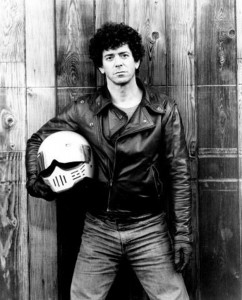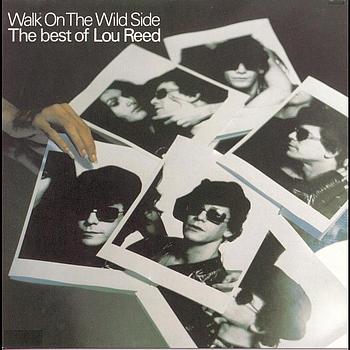Despite oh-so-reverential commentary by eternal rock dude-scholar David Fricke to the contrary the recent PBS American Masters documentary on Jimi Hendrix confirmed that the guitarist’s post-Experience career was pretty much a waste. Did you watch it? The trailer, above, is pretty cool in its own right, and even if you don’t care for Hendrix you will get a quick look at modern-day Steve Winwood‘s brilliant and unexpected muttonchops!
It’s the beginning of a Lou Age. Some questions remain in the balance following the death of Lou Reed that, following a respectful period of mourning, perhaps Rock Town Hall is best qualified to answer.
- If his album with Metallica is the last batch of new recordings to have been released does that mean that that album was, definitively, the final word on how Lou Reed was meant to sound, or will the ghost of Lou emerge to proclaim that each new set of posthumous recordings that emerge is actually how his music was meant to sound?
- Who will play Lou in the biopic? Assuming that a dearth of opportunities for badly glued-on facial hair will keep Oliver Stone out of consideration as director, who should direct this film?
- Who do you predict will be the least-appropriate musician to appear in a sure-to-be-star-studded tribute to Lou held at Madison Square Garden or the Rock ‘n Roll Hall of Fame? What song will said artist butcher or, shockingly, make work? What song will a hip-hop artist cover? What song will a contemporary country artist cover? Will Arcade Fire back Bowie or Springsteen?
- Will we ever get the real story on Reed’s teenage or post-Velvets shock treatment? Is that a rock myth along the lines of Dylan’s motorcycle crash and ZZ Top performing with buzzards and buffalo on stage?
I look forward to your answers.
In the days following Halloween I participated in a few conversations, with adults and kids, about candies collected through the trick-or-treating process. People who’ve known me for a while know that I’m pretty old school in my candy tastes. People who only know me casually and learn this fact about me are not surprised.
Although I don’t have much of a sweet tooth, I have strong opinions on candy. I’ve been known to rail against “reformatted” candies. This hang-up probably dates back to the launch of “bite-size” or “fun-size” candies, which I have gotten used to, thanks in part to those little Hershey’s Special Dark bars, which only seem to exist in fun size, thereby making them “original” candies. Reformatted candies are wrong for reasons of questionable character (ie, Who are you fooling by worrying about your diet as you shove a half dozen fun-size candies down your throat rather than a full-size candy bar?). The candy reformatting practices that will forever stick in my craw, however, are related to shape and flavor. For instance, I don’t want my beloved Reese’s Peanut Butter cups in any form other than the classic circular, with the ridges around the edge. Changing the shape of a candy redistributes the ratio of flavors as well as the sensations when it hits one’s tongue. My tongue can adjust to the ever-shrinking circumference of a Reese’s, for instance, and my tastebuds are not alarmed by the slightly smaller dimensions, but a change in a candy’s shape messes with both the taste and the sensation of eating it. Not cool!
Lou’s no longer with us in body, but that doesn’t mean his true artistic intents cannot continue to be illuminated.
The 1983 movie Get Crazy, featuring our hero, was a flop. You know why? Because the director left 83 minutes of Lou-free footage in the final cut! Someone cut the movie down to the 9 minutes featuring Lou. Check it out and tell me this shouldn’t be reissued as the Director’s Cut, If Lou Reed Had Been Allowed to Direct the Movie.
Thanks for cherguevarra for passing along this find!
Listen, I’m in an incredibly bad mood today (it has nothing to do with you), but don’t think I’m not man enough to welcome an intelligent discussion on a piece of rock criticism that appeared in The Washington Post.
On a friend’s Facebook page people are sharing mixed opinions on critic Chris Richards‘ handling of his negative review of The Arcade Fire‘s new album, Reflektor. It’s not Richards’ opinion they seem to be reacting to but his tone. I don’t get it. What’s wrong with a critic thinking an album sucks and writing about it as he or she feels? Why do I sense some candy-ass regard for the critic’s tone? It’s a stinking rock ‘n roll album and one person’s opinion of it. It’s not a dissenting opinion on a Supreme Court decision.
After winning a Grammy for album of the year in 2011, they’re still the biggest rock band on the block, still making music mysteriously devoid of wit, subtlety and danger. And now, they’re really into bongo drums, too. We should all be repulsed. Only partially because of the bongos.
Candy-asses of the Rock World: Please explain what’s wrong with this negative review of The Arcade Fire’s new album, Reflektor.
People on my friend’s Facebook page are lashing out at this guy for being “tragically hip,” for feeling slighted by the “cool kids.” In my formative rock years, these admittedly pathetic feelings were a badge of honor, a rite of passage. What rock snob worth his or her salt didn’t feel left out by the cool kids? Is it no longer cool to feel left out? Is everybody happy nowadays? Everybody but me and Chris Richards?
Just last week I was asking my 16-year-old son if there’s anything kids can be made fun of these days. We were joking around, but there was an undercurrent of snobbish pride in our joking. In a world where young people can walk around in “slides” (ie, those sporty flip-flops) and white knee-high socks without shame, how can anyone know their place, from bullies to misfits?
Listen, anyone past a certain age should grow up and grow past whatever feelings might have fueled their essential take on rock ‘n roll, but if in our judgments of rock ‘n roll music we totally deny that kid, be it a kid who sat at the cool table or one who was excluded, I’m not sure we’re fit to listen to rock ‘n roll any longer. Or maybe we’re not fit to critique it any longer. Rock ‘n roll is there for the taking, enjoying, hating, whatever. It’s not something we are obliged to approach and assess through some formal, respectful, educated, mature eye. That is one approach that can be taken, but why should it be the only approach?
I first became aware of Lou Reed when I was 13 or so, the year I finally dipped into FM rock radio after a childhood of scratchy 45s; my first 2 dozen LPs by the likes of The Beatles, The Band, Joe Cocker, and Traffic; AM radio; and the latest TSOP album-length cuts hot off Philadelphia’s FM soul station, WDAS. Rock radio on the FM dial in 1976 wasn’t all the cool, older kids at my school made it out to be. I got to hear cuts from Who’s Next for the first time and more Mick Taylor-era Stones than I’d ever heard before on AM radio—and there Beatles A to Z weekends galore—but I had to wait through a bunch of stoopid blooz-rock that typically bored me once songs ran past the 3-minute mark: Led Zeppelin, Ted Nugent, Lynyrd Skynyrd, The Allman Brothers…not to mention the often perplexing genre known as progressive rock. Jethro Tull slotted in between all these uncomfortable sounds. Worse yet, FM rock in Philadelphia circa 1976 featured way more Jackson Browne and Eagles than I could stomach. Often I figured, The hell with trying to impress the cool kids! and flipped back to the comforting AM sounds of The Spinners and Elton John.
One long guitar-driven song that occasionally hit the airwaves on WMMR and WIOQ at that time was the Rock ‘n Roll Animal version of “Sweet Jane.” I already knew and loved “Walk on the Wild Side,” which somehow got played on AM radio when I was a preteen, but Lou Reed was just a name back then. The live version of “Sweet Jane,” with its swirling, fuzzed-out guitar intro followed by Reed’s strange, talk-sung, hectoring vocals and fatalistic lyrics always made me reach for the dial, the VOLUME dial. I cranked it up and marveled at the crunch Reed and his band produced. While the cool kids were slobbering over the quintuple-guitar solos of bands playing California Jam, I wanted to know more about the racket that this Lou Reed character was making. “Sweet Jane” (the live version), long intro solo and all, was the kind of song worth sticking out a friggin’ Foreigner song in hopes of hearing. The hairs stood up on my neck every time Reed sang, “Some people like to go out dancing/There’s other people like us, we gotta work.” This was the language I heard from my hard-working Mom after another long day’s work. This was way more true to the language in my home than songs about rockin’ and rollin’ all night, as was that “life is just to die” line that caps off “Sweet Jane.” Many a Saturday and Sunday morning in my house growing up was centered around such certain thoughts, as my Mom struggled to get out of bed and face another lonely day.
After a few months of waiting for “Sweet Jane” to play, I finally took matters into my own hands, buying the Rock ‘n Roll Animal album as well as a cheapo “best of” album. The “best of” album included “Walk on the Wild Side,” of course, as well as a bunch of songs that were really strange to my ears. “Satellite of Love” sounded familiar, like a David Bowie or Mott the Hoople song I would have already known, but some of the awkward songs stuck out, stuff like “How Do You Think It Feels,” which dealt with really personal, depressing stuff in a stilted musical arrangement. Like some of those lines from “Sweet Jane,” the mood of the song rang surprisingly true to the mood that sometimes pervaded my house. “Wild Child” was an easy release, like a cheap follow-up to “Walk on the Wild Side.” Some of the other songs were unlistenable for me then and now. From the beginning I would come to terms that Lou Reed had an amazing propensity to turn out absolute crap.






